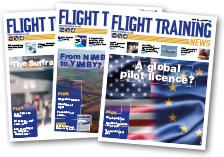After an unprecedented three-month shutdown of the vast majority of the UK’s flight training industry, the long-awaited news that Government was changing its advice to the flying schools of the UK came at around midday on 26 June.
The message from David Harding, (Department for Transport Deputy Director, General Aviation, Skills, Safety and CAA Division), to General Aviation associations was succinct and to the point: “I can confirm that the reopening of GA businesses and the safe restart of General Aviation dual and instructional and instructional flights will be permitted from 4 July 2020 in England”.
The news quickly spread through associations’ websites and e-mails announcements and social media, followed almost as quickly by prolonged on-line discussions about the legal definition of the word ‘dual’* – for example could this cover non-instructional flights? – and more questions about the situation in the ‘devolved’ nations of the UK.
In Scotland, 03 July marked the resumption of commercial pilot training, but recreational flying training is not expected to resume until around the middle of July, subject to the COVID-19 reinfection rate remaining low.
In Wales, an easing of lockdown measures, including restrictions on how far people can travel from their homes, started on 06 July as FTN went to press, but it is not yet known whether this will result in a resumption of flying training.
At the time of writing, there was no update available as to when flying training could resume in Northern Ireland.
Lord Davies of Gower, co-chair of the All-Party Parliamentary Group for General Aviation (APPG-GA), has been leading a call for greater coordination between HM Government and devolved Governments. In an address to the House of Lords last month, Lord Davies said: “… the co-ordination between certain departments of Her Majesty’s Government and the devolved Governments of the UK has been a little confusing.
“Aviation is an example of a reserved matter [areas of policy where UK Parliament retains full control]. However, two weeks ago, the Secretary of State for Transport announced that general aviation could happen again because it was determined that the risk of contributing to increased infection was minimal.
“As a reserved matter, it follows that the DfT has a UK-wide responsibility for GA, yet only last week, pilots in Scotland were permitted to take to the skies while those in Wales and Northern Ireland are still waiting for the go-ahead. What discussions, if any, are taking place between the Government and the devolved Administrations about achieving a consistent UK-wide approach to general aviation?”
Following the announcement that recreational flying training could recommence in England from 04 July, the DfT published refreshed guidance to help the sector recommence operations as safely as possible.
If a two-metre separation distance cannot be maintained … then schools will need to carry out a coronavirus risk assessment and take appropriate action to reduce the risk of virus transmission
The guidance states that if a two-metre separation distance cannot be maintained, or individuals cannot be isolated in separate cockpits, then schools will need to carry out a coronavirus risk assessment and take appropriate action to reduce the risk of virus transmission. The practical advice includes maintaining two metre separation whenever possible, and the wearing of face coverings, while only mandatory for passengers, is strongly recommended for all flight crew.
In a letter emailed to flying school operators 01 July, the CAA stated that schools should be aware that the Authority is unable to provide specific advice on public health issues and also cannot officially ‘approve’ virus containment measures enacted by schools, adding that: “…every affected organisation will have to take different considerations into account depending on the range of approvals that they hold, their facilities and their operating environment.
“Training organisations will need to regularly review their risk assessment to ensure it remains relevant and appropriate. The Health and Safety Executive encourages organisations to identify measures in a priority order. Risk assessments should take account of other risks and ensure controls implemented for coronavirus do not increase risks due to other hazards.”
Now that recreational flying training can resume in England, the wider question is how many trainees will actually want to continue to learn to fly and for that matter, will all flying school choose to re-open? While commercial pilot cadets have a vested interest in completing their training in order to commence their flying careers, those undertaking flying training purely for pleasure may be less motivated to recommence their PPL courses. Likewise, FTN understands that some flying schools and clubs have decided not to re-open, for the time being at least.
a number of students, perhaps as many as 50%, are not yet ready to recommence training
Speaking with a flying school based at Henstridge Airfield in Somerset, it would appear that a number of students, perhaps as many as 50%, are not yet ready to recommence training and some may not return at all. The reasons given have included a lack of funds, due to either being furloughed or laid-off from their jobs, as well as a number of students either falling into the higher COVID-19 risk category, or living with family members who are in a high risk category.
Some instructors have also informed FTN that while they are happy to continue teaching PPL students they are not keen on delivering trial flights to first-time fliers as they fear that the more individuals they are exposed to, the higher the risk is of catching the coronavirus. If this concern becomes prevalent amongst instructors then flying schools, which rely heavily on these type of air experience flights for income, may struggle to remain profitable and attract new starters
Schools which rely on flight training solely for their income, as opposed to those which also own/manage the airfields they operate out of and who can supplement their income from fuel sales, landing and parking fees, are also concerned about being able to meet licensing and aircraft maintenance fees after having received no income for the last 100+ days.
At the beginning of June, the CAA announced that they were launching a payment plan for businesses struggling to meet their annual charges and, on application to the CAA finance department, could be provided with a payment deferral up until February 2021. However, one flying school operator has contacted FTN to advise that his application for payment deferral has been rejected. He requested that the annual certification charge for his FNPT I simulator, costed at just under £1000, be deferred under this scheme. He was informed that his application had been rejected due to the amount being less than one thousand pounds, a minimum figure that was not promulgated in the CAA Skywise briefing that announced the scheme.
the Authority has sent schools a questionnaire asking for feedback on the impact of the pandemic lockdown
At the same time that the CAA finance department is apparently refusing to defer sub-£1,000 charges, the Authority has sent schools a questionnaire asking for feedback on the impact of the pandemic lockdown. The questionnaire asks what the impact has been on businesses, whether they are able to resume operations as normal, or only partially, or not at all. Other questions include asking what the impact has been on staff members – have they been put on reduced hours, furloughed or made redundant. The questionnaire also asked what recovery plans businesses are able to put place.
FTN asked a CAA spokesperson whether this questionnaire was a call for evidence ahead of the CAA/DfT potentially seeking financial assistance for the flight training industry from HM Treasury. We were told: “The questionnaire is to give us data on the impact of COVID-19 on the whole GA community (other, similar questionnaires have been sent to maintenance organisations, specialist operators and ballooning, gliding and parachuting clubs). The results will also be shared with DfT colleagues to help them with their work and when they deal with other Governmental departments.” Despite this non-committal response, FTN understands that GA associations and representatives have been assessing the potential losses suffered by the UK flight training industry over the last three months, and these assessments are expected to be discussed with the Treasury within the next 10 days.
Meantime, having experienced three months of almost unbroken VFR flying weather in the UK whilst in ‘lockdown’, the latest potential challenge for the flying training community could be the vagaries of the UK summer. According to Met forecasters, the summer season is looking volatile and as one forecaster put it: “Having such a dry spring normally doesn’t bode well for a ‘good summer’ as periods of four to six months of dry weather across the UK don’t come around very often.”
Maybe in the end it was fitting that over the first weekend of the resumption of flight training, much of the UK experienced low cloud, rain and high winds. In a strange way, some found the phenomena of flying plans being interrupted by the weather as reassuringly normal in the midst of the strangest times in living memory.
*Note: on the vexed question of the meaning of ‘dual’ flying, the EASA FCL rules refer to dual in the context of dual flying instruction, including this definition: ‘ “Dual instruction time” means flight time or instrument ground time during which a person is receiving flight instruction from a properly authorised instructor.’







